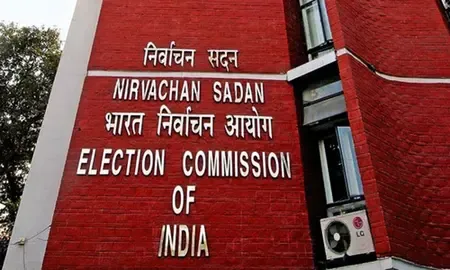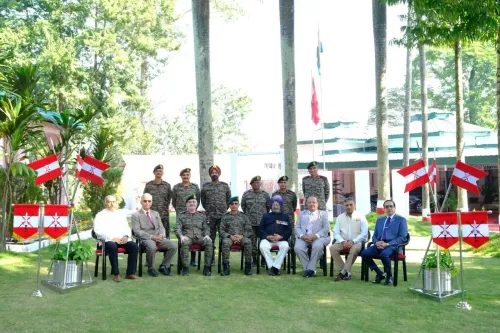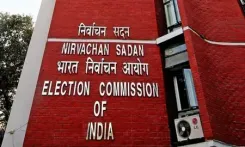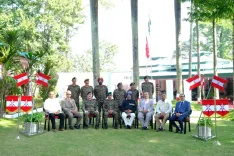What Did MP Students Discover About Conservation and Traditional Farming in a Nagaland Village?
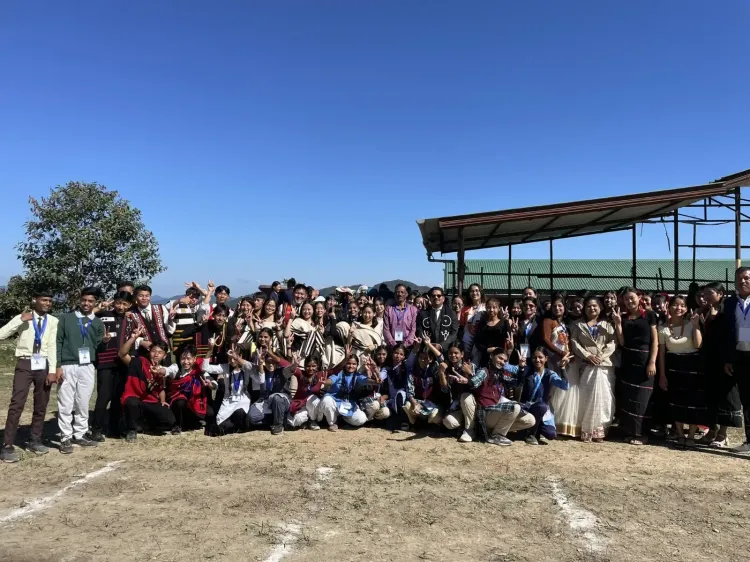
Synopsis
Key Takeaways
- Immersive Learning: Direct exposure to Nagaland's cultural heritage.
- Cultural Exchange: Interaction between students from Madhya Pradesh and Nagaland.
- Historical Insights: Visits to important historical sites like the Kohima War Cemetery.
- Bamboo Innovation: Insights into sustainable practices at the Bamboo Resource Centre.
- Environmental Awareness: Understanding of conservation efforts in Khonoma.
Kohima, Nov 27 (NationPress) A group from Madhya Pradesh, consisting of 28 students and seven officials, had a transformative four-day expedition in Nagaland, where they observed the Angami Naga community's innovative conservation techniques, traditional farming practices, and outstanding wildlife preservation initiatives in Khonoma village.
Khonoma, previously acknowledged as Asia's inaugural "Green Village", provided the visiting students with insights into the various traditional customs of the Angami community.
A government representative in Kohima indicated that this 35-member delegation undertook their visit to Nagaland from November 24 to 27 under the "Ek Bharat Shrestha Bharat" (EBSB) initiative of Samagra Shiksha, aimed at enriching cultural and educational exchanges to promote unity and national integration.
The delegation was headed by Mahesh Jain, Joint Director of Samagra Shiksha Madhya Pradesh.
Upon their arrival on November 24, officials from Samagra Shiksha Nagaland oriented the visitors about the region's cultural aspects, educational goals, and the overall aims of the EBSB program.
This orientation laid the groundwork for an immersive journey that enabled students to gain direct exposure to Nagaland's rich heritage, customs, and educational atmosphere.
The following day (November 25), the group explored several significant historical and cultural sites that showcase Nagaland's unique identity.
They visited the Nagaland State Museum, where a diverse collection of traditional artifacts, tribal attire, tools, and historical displays provided a rich overview of the state's cultural diversity.
This was succeeded by a visit to the renowned Kohima Cathedral Church, praised for its stunning architecture and serene environment, where the students learned about the region's spiritual and cultural evolution.
A vital aspect of the tour was the interaction with local schools on November 26, which allowed students from Madhya Pradesh and Nagaland to engage in enriching peer-learning experiences.
Madhya Pradesh students participated in kho-kho, traditional games from Madhya Pradesh, friendly tug-of-war contests, and even joined in traditional Naga dances, fostering enthusiasm, camaraderie, and appreciation for each other's cultures.
These activities dismantled barriers, enabling students to connect beyond linguistic and geographical divides through shared experiences and joyful interactions.
In addition to cultural and educational encounters, the delegation also paid respects at the Kohima War Cemetery, honoring the soldiers who perished during the Battle of Kohima.
This solemn visit provided a moment for historical reflection and enriched the students' understanding of Nagaland's role in global wartime history.
On November 27, the group toured the Nagaland Bamboo Resource Centre in Dimapur, celebrated for its bamboo innovation initiatives, skill development programs, and promotion of sustainable livelihoods.
This visit exposed students to the state's distinctive strengths in bamboo craftsmanship, resource management, and entrepreneurship.
The entire tour under the "Ek Bharat Shrestha Bharat" program encapsulated the essence of national unity by fostering cultural appreciation, mutual learning, and meaningful interactions among the youth, as stated by the official.
Through their exposure to Nagaland's heritage, school ecosystem, and community-led initiatives, students from Madhya Pradesh gained invaluable insights while also sharing their own cultural identity, thereby reinforcing the bond between the two states.
Samagra Shiksha Nagaland looks forward to ongoing collaboration within the EBSB framework, promoting deeper understanding and unity across regions, the official concluded.



